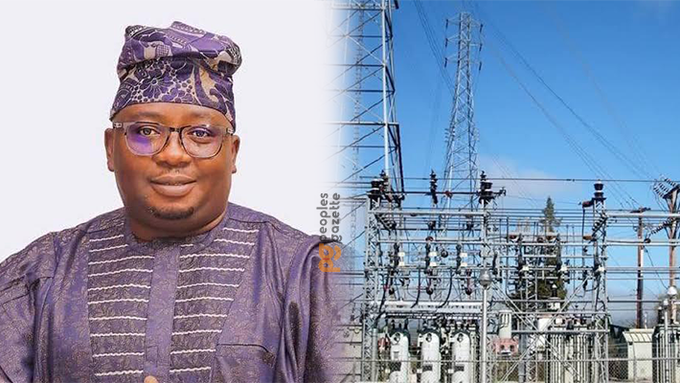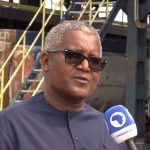The inability of distribution companies (DisCos), to handle the total generation of power in the recent times highlights a significant obstacle in the chain that supplies electricity.
Yesterday, chief Adebayo Adelabu stated that power generation had peaked on Friday, August 30, 2024, at 5,170 megawatts, but that 1,400 megawatts had to be reduced since DisCos were unable to select a supply.
“This is really regrettable considering that government is on course to increase generation to 6,000 megawatts by the end of the year,” Adelabu stated.
But he did assure that all efforts were being made to guarantee that the nation will have a steady supply of electricity.
As part of President Bola Tinubu’s delegation to the China-Africa Cooperation Summit, Adelabu spoke at a facilities tour of the TBEA Southern Power Transmission and Distribution Industry in Beijing, China.
He acknowledged that as part of the Presidential Power Initiative (PPI), the federal government had put in place, plans to release $800 million for the construction of substations and distribution lines.
The funding will guarantee the $400 million development of Lot 2 substations as well as Lot 3 distribution lines and substations.
The franchise regions of Benin, Port Harcourt, and Enugu DisCos are covered by Lot 2, and the franchise areas of Abuja, Kaduna, Jos, and Kano DisCos are covered by Lot 3.
Speaking at an interactive session with TBEA management, Adelabu reiterated the federal government’s commitment to collaborating with top-tier organisations like TBEA to bring to life President Bola Tinubu’s Renewed Hope agenda for Nigeria’s power sector, particularly in regard to transmission and distribution of the country’s renewable energy sector and the entire power sector value chain.
Speaking about the issues weighing down the country’s power industry, the Minister said that part of the reason for this is the old and deteriorated transmission and distribution infrastructure. “This has resulted in a historically irregular power supply to households, businesses, and industries.”
According to him, more than 59 per cent of industries in the Nigeria are off the grid. “They did not see the national grid as reliable and dependable. So a lot of them now operate their own captive, self-generated power”.
Adelabu said the President Bola Ahmed Tinubu’s administration is determined and focused on transforming the power sector adding that a lot of activities have started that is gradually bringing back confidence in the sector and among the power sector consumers especially the industries.
Adelabu noted the many government initiatives and spoke about how Nigeria was able to create 2,000 megawatts around 40 years ago in 1984,”and it took us more than 35 years to add an additional 2,000 megawatts.
“When this administration came in last year, we met around 4 gigawatts (4,000 megawatts) of power but within a year, we were able to generate a milestone of 5,170 megawatts adding about 1000 megawatts of power within the first year. It may look small, but compared to the history of the country, this is commendable”.
“Our plan is by the end of the year, we aim to achieve 6,000 megawatts of power through a combination of hydro electric power plants and our gas- fired power plant. We are also targeting 30 gigawatts of Power to be generated, transmitted and distributed by year 2030 out of which 30 percent would be renewable energy”.
According to him, the renewable energy sector would consist od a mix of solar energy, wind farms powered by onshore and offshore winds, and hydroelectric electricity from small dams.
Regarding the matter of building the super grid, the Minister stated that the current status of the national grid is unable to accommodate the goals for the power industry.
“If we look at the strength, the capacity and the age of our existing network on the National grid, it cannot really support our vision for the power sector hence the need for the construction of the Western and Eastern super grid. Though we have been on this since my resumption, I can also tell you that the President is in full support of this because this will improve our transmission network, stabilise the grid and also expand the capacity and the flexibility of the National grid”.
He stated that the necessary actions are in place for 90% of the work and would shortly be finished.
Prior to this, Huang Hanjie, President of TBEA, made a speech in which he pledged the organization’s ongoing support for the Nigerian government’s power sector vision. He said that TBEA would be pleased to share its experience in energy provision and that it currently operates in 100 countries worldwide.
He stated that TBEA is not a new company in Nigeria and that it now operates with the Niger Delta Power Holding-owned Omotosho power plant in Ondo State (NDPHC).
Hanjie also commended the Minister on the advancements in the electricity industry since taking office, as shown by increased generation and transmission. The short-term improvements to 6 gigawatts by December 2024 and 30 gigawatts by 2030 were also acknowledged, and he stated that TBEA would be happy to collaborate with the Nigerian government to realise the vision and support the ongoing revolution in the country’s power industry.
He expressed interest in TBEA joining the Nigerian government’s projected Super grid and offering its expertise to ensure the project’s success.




